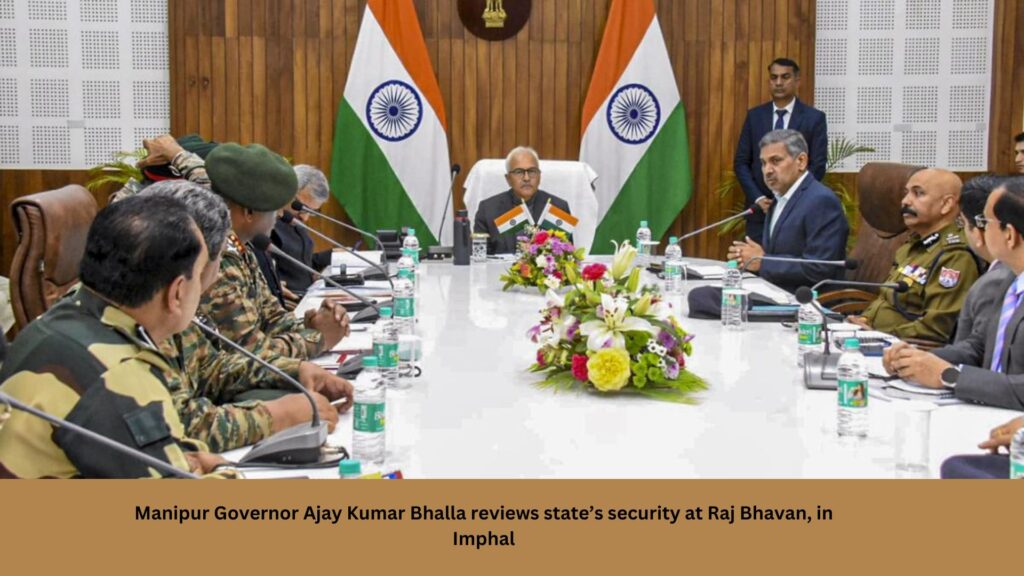In a decisive move to address Manipur’s escalating law and order challenges, newly-appointed Manipur Governor Ajay Kumar Bhalla convened a high-level security review meeting at Raj Bhavan on Saturday. The meeting, aimed at restoring stability and fostering long-term peace, emphasized stringent measures against miscreants and stressed creating employment opportunities for the state’s youth.
Governor Bhalla proposed utilizing the National Security Act (NSA), 1980, to curb the activities of those inciting violence. This legislation allows for preventive detention of up to one year without trial, a strategy the Governor suggested to deter potential troublemakers. Security Adviser Kuldiep Singh and Director-General of Police Rajiv Singh were among the attendees, while Chief Minister N. Biren Singh was notably absent.
During the meeting, Governor Bhalla directed security agencies to compile comprehensive dossiers on key suspects suspected of orchestrating unrest in the state. “Addressing youth disillusionment through meaningful employment opportunities is a critical parallel strategy,” Bhalla said, emphasizing the need to counter the appeal of insurgent activities.
Central forces highlighted violations of ceasefire agreements by the Pambei faction of the United National Liberation Front (UNLF), a Meitei insurgent group advocating Manipur’s secession. The UNLF, which signed a peace agreement with the Union Home Ministry and Manipur government in late 2023, has been implicated in breaching ceasefire protocols. In November, 80 members of the group surrendered with 31 weapons, marking a step toward peace that now seems fragile.
Yaingangpokpi (YKPI) in Imphal East has emerged as a volatile hotspot, witnessing over 50 firing incidents since December 24. This buffer zone between the valley and hills has seen mounting tensions, exacerbated by ethnic divides between the Meitei and Kuki-Zo communities.
On December 30, Central Armed Police Forces (CAPF) established a camp in Saibol village near YKPI to quell unrest. However, this move triggered violent protests led by local women, some of whom sustained injuries in clashes with CAPF personnel.
The proximity of Kuki-Zo and UNLF insurgent camps to YKPI has further complicated the security landscape. Intermittent firing between community groups escalated after a December 24 incident, prompting a joint security operation that dismantled six Kuki-Zo bunkers in Phaimol.
The unrest spread to Kangpokpi, a district more than 60 kilometers from YKPI, where a protest organized by the Kuki-Zo Committee on Tribal Unity (CoTU) turned violent on January 3. The Superintendent of Police (SP) sustained injuries during the confrontation, which centered on the removal of the CAPF camp in Saibol.
Kangpokpi also saw armed cadres of Kuki-Zo insurgent groups, who are bound by a 2008 Suspension of Operations (SoO) Peace Pact, roaming the streets to manage the protests. This violated the pact’s stipulation that cadres remain in designated camps with weapons secured.
“The agitations have become leaderless, creating a vacuum filled by armed insurgents attempting to control the narrative,” a government official said.
Since June 2023, buffer zones have been established between the valley and hill regions to prevent clashes. These areas, guarded by CAPF personnel, are designed to de-escalate tensions. However, incidents like those in YKPI and Kangpokpi underscore the fragile nature of these arrangements.
“The strategic removal of bunkers in Phaimol and Urangpat has provoked resistance,” said a defence source. “These elevated bunkers gave the Kuki-Zo groups a tactical advantage, which Meitei communities perceive as a constant threat.”
Governor Bhalla’s meeting highlighted the urgent need for coordinated action among security forces and local administration. The deployment of CAPF, BSF, and Assam Rifles will focus on stabilizing high-risk areas like YKPI and Kangpokpi while maintaining vigilance across the state.
Governor Bhalla’s dual focus on stringent legal measures and youth empowerment aims to address both immediate and long-term challenges. By targeting the root causes of unrest and providing alternatives to insurgency, the administration hopes to pave the way for sustainable peace in Manipur.
As tensions simmer, the next few weeks will be crucial in determining the effectiveness of these strategies. Whether the state can transit from turmoil to tranquility will depend on the collective resolve of its leadership, security forces, and communities.







